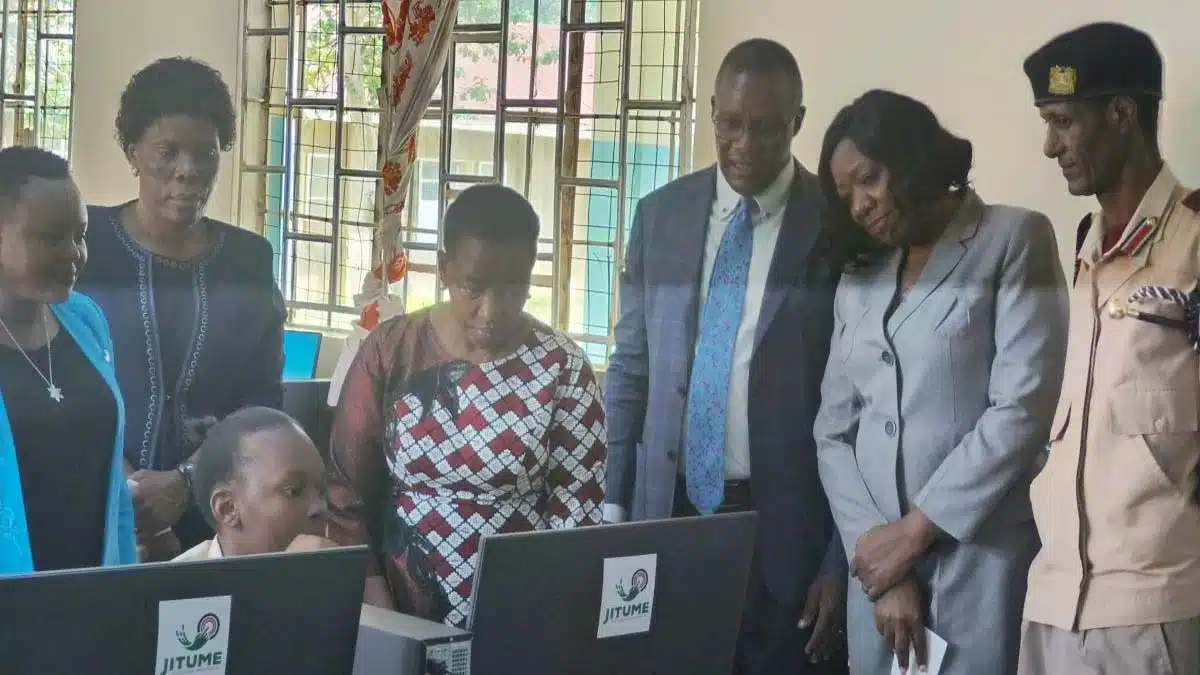Rachel Ruto, Kenya’s First Lady, joined Butere Girls High School in Kakamega County to launch the 83rd Digital Hub of the year. The event marked a great milestone as part of the Jitume Digital Project. Accompanied by Information, Communication, and Digital Economy CS, Eliud Owalo, the First Lady highlighted the ability and capacity of the initiative to spur and spearhead societal and economic changes.
Transforming the Nation Through Digital Literacy and Job Creation
Jitume Digital Hub project aims to enhance digital literacy as well as creating job opportunities. So far, it has connected over 28,000 users with over 8,700 courses and 118 digital job platforms spread all over Kenya. While referring to how it rhymes with the vision of President William Ruto, the First Lady got the chance to urge users to spend most of their computer time in productive and responsive ways amidst the growing cases of cyber threats.
“The full implementation of the Jitume Digital Hub project will spur a wave of digital jobs across the nation in relation to our President William Ruto’s clarion call ‘Finya Computer Upate Dollar’,” Rachel Ruto said.
Promoting Education in the Fields of Science, Technology, Engineering, and Mathematics, the First Lady emphasized that the digital hub was geared towards improving Science-technology, Engineering and Mathematics; STEM education for students at Butere Girls High School. She urged the learners to be agile and prepared to seize new opportunities brought by the fourth industrial revolution and generative artificial intelligence.
“As the country gears towards the fourth industrial revolution, let us be agile enough to see that emerging opportunities can be grasped. We live in the age of generative artificial intelligence where technology makes work possible and ignites efficiency, and we should be prepared for such a new era,” she added.
Government’s Commitment to Digital Expansion
Cabinet Secretary Eliud Owalo noted that the government was committed to digital expansion, with millions of hubs across 203 institutions, all installed with over 13,000 devices. Already, 490,000 youth have been trained so far in digital skills, and in this last year, 139,000 digital jobs were created by the government.
This is very transformational because, very soon, if we pursue this to a logical conclusion, we should be able to sort out the basic unemployment challenges that we have been facing in this country,” he noted.
Future Plans for Digital Hubs
Owalo announced that he would set up over 1,460 ward level digital hubs to offer lessons in digital literacy in addition to being film production centres and avenues for accessing government services. He concluded that it would actually change the life of young people by linking them up with global tech firms as a way of providing a solution to unemployment issues.
“This will be a game changer for this country because we will be having our young brothers and sisters there in the village working for global technological companies and being paid in foreign currencies, solving the unemployment challenge that we have been facing in the country,” he said.
Enhancing Access to Government Services
The digitalization, as usual, bore the greatest manifestation in the services arena, which currently numbers more than 16,892 services on the E-citizen platform. Cabinet Secretary invited Kenyans to also take advantage of these digital advancements to access education among other services.
“As of October 30 last year, President William Ruto opened the first Kenya Open University domiciled at the Konza Technopolis.”. This is relevant because you are now able to enter the university online, whereas you used to be physically confined to the four walls of a classroom. This, again, will help us reduce the cost of education very drastically, as education is the greatest equalizer. We want to make education affordable under this government,” he added.
Infrastructure Development for Connectivity
The government’s initiative includes laying of fiber optic cables over a total of 100,000 km, utilizing the exiting infrastructure of Kenya Power Transmission Lines to extend internet connectivity across the nation. This termination model aims at connecting schools, markets, public institutions, and villages by terminating the fiber cable at over 74,000 transformers.
“We have changed the model of rolling out the fiber. Instead of digging the trenches down, we are now going to use the KPLC transmission lines to help us take fiber connectivity to all parts of the country,” Owalo explained.
Installing Wi-Fi Hotspots
The government will also set up 25,000 Wi-Fi hotspots across the country to drive its digital economy agenda. Owalo was upbeat about the government’s potential to turn Kenya into a digital economy, with an delights vision of a paperless government and a 24-hour economy.
“So we are on the right path, and I want to reassure everybody that we are determined, under the guidance and supervision of the President, to make sure that we transform Kenya into a digital economy,” he concluded.
